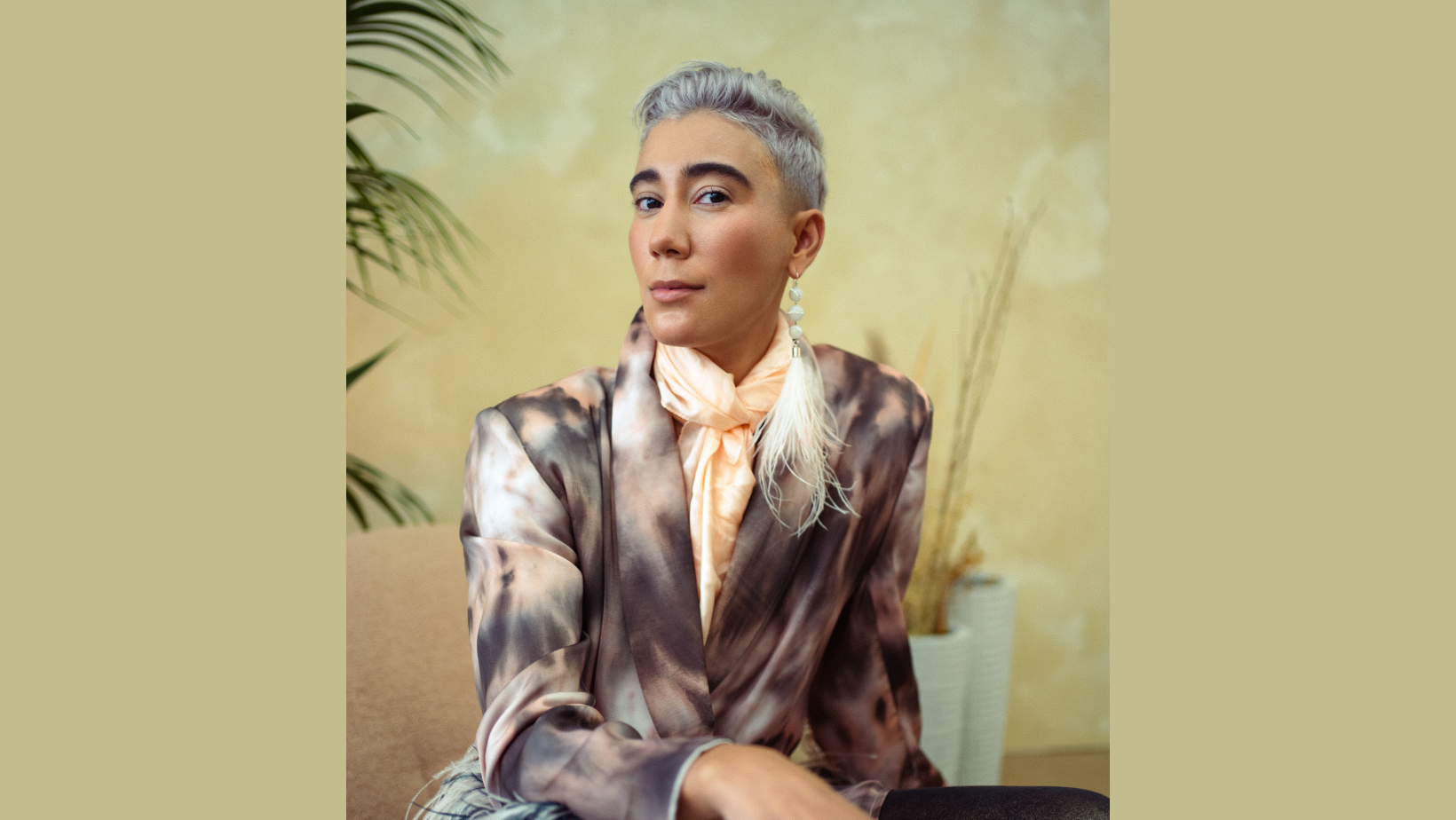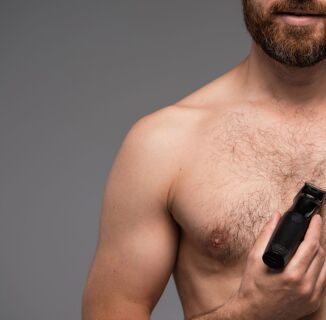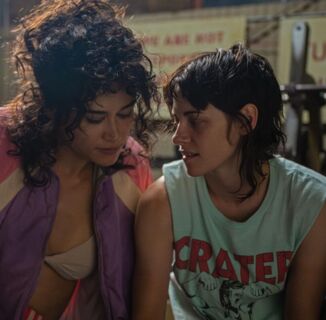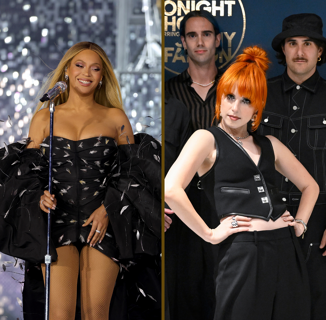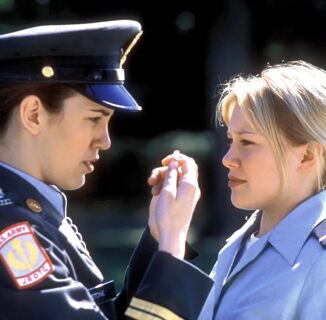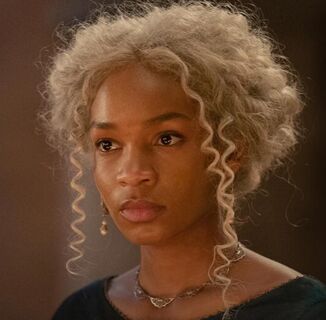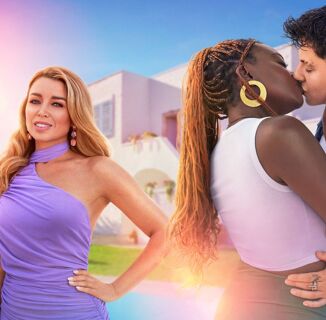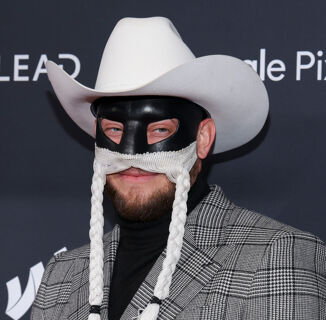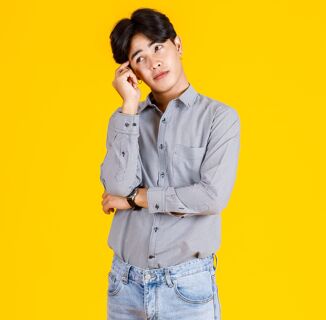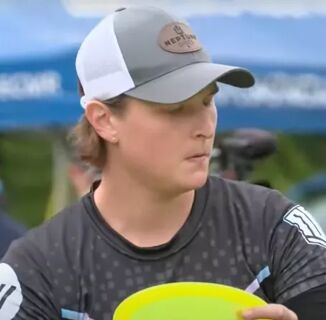Nonbinary actor Vico Ortiz has been preparing for this role all of their life. Or, at least, since they were seven years old dreaming of sailing the high seas as a pirate. Maybe it was something in the stars, maybe it was that Scorpio mystery, or maybe it was the fact that Ortiz—the insanely talented actor you’ve seen in “Sex Lives of College Girls” and “Everything’s Gonna Be Okay”—was always the one and only possible choice to play the role of Jim, the queer, gender-questioning pirate who easily stands as the best part of Taika Waititi’s hilarious new series, “Our Flag Means Death.” Set in the Golden Age of piracy, the show follows the life of Stede and his pathetic crew on the good ship Revenge as they tangle with colonizers, sail the high seas, and engage in all kinds of high-spirited fuckery. It’s Captain Blood on acid, and maybe the first honest portrayal of what life was really like for the queer misfits and folks of color who history has erased from all those seafaring tales.
But no more: “Our Flag Means Death” is a silly, magnificent skewering of the ultra-butch concepts we have about pirate narratives, as well as a delightful exploration of gender itself. When we meet Ortiz’s character Jim, they’re wearing a fake nose and long beard. Soon, we learn that there’s more to Jim than meets the eye, and it’s thanks to Ortiz’s heartfelt, brilliant comic portrayal of Jim that the story gets to explore ideas around masculinity, society, and gendered expectations.
It’s also just, you know, super funny.
We sat down with Ortiz to talk about how they brought Jim to life—or rather, manifested them into existence.
INTO: Can I just say I loved your photo on Twitter.
VICO ORTIZ: So when I auditioned for this, I had a mustache with me because I was in Puerto Rico and I was planning on maybe doing some drag shows over there—I’m a drag king, so I have mustaches and beards available. So I had a mustache with me, and I auditioned with the mustache. For the call back and the meeting that I had with David Jenkins, my dad found this like white beard that actually gets featured at some point in the show. So I wore this white beard and black mustache and a red bandana. Two weeks later, my Dad is like, “You are not going to believe this, look what I found.” And he sends me a photo of me like seven years old or five years old or something like that, with the same look, like with a drawn-on white beard, a black mustache, and the red bandana. And I was like, “Are you kidding me?” I like literally dressed up like I did when I was like five years old for this like thing, without thinking about it. I just was like, “I have it, here we go.”
10 days left for #OurFlagMeansDeath to set sail on the @hbomax high seas! I’ve been preparing for this role for quite some time it seems like 👀🖤✨ pic.twitter.com/yXwmzd6g9I
— Vico Ortiz (@V_Vico_Ortiz) February 22, 2022
It’s such a dream role because there’s that element of disguise, and it’s also obviously trans and queer. And I love the late reveal of your character [Jim.] I’m watching the show and I’m like “Where’s Vico? What’s going on?” And then like the last minute of the episode I’m like, “Oh shit, like right there in front of me.”
I’ve kept this secret for so long, and I have so many of my friends being like, “Where are you in the trailer?” And I’m just like, “I cannot say anything at all.” It’s such a fun reveal, and it’s so satisfying too. Wearing the beard and the fake nose was like so euphoric. Once everything was put on I was like, “This is incredible.” I got really emotional.
Playing Jim has been just so powerful and it’s empowering to reclaim these stories. Oftentimes when, you read history books, it’s like, “Oh, she was crossdressing,” or “he was crossdressing,” or like “they were best friends and were together forever,” but it’s like were they really best friends though? They wrote each other letters for how many years now? There are stories of people like us who found themselves in extraordinary situations that allowed them to explore who they were, and to be accepted for who they were. When I got the part I was like, “Okay, I want to make sure that Jim is Jim with or without the beard.” Like, the beard doesn’t make them less feminine, or more masculine. They just are. They’re not trying to “act like a man.” They just are a human being in this like experience, and they’re able to see what masculinity feels like for them what femininity feels like on their own terms without the pressure of societal structures and expectations. And to do that in a pirate setting and have the crew be like, “Yeah, okay, this makes sense.”
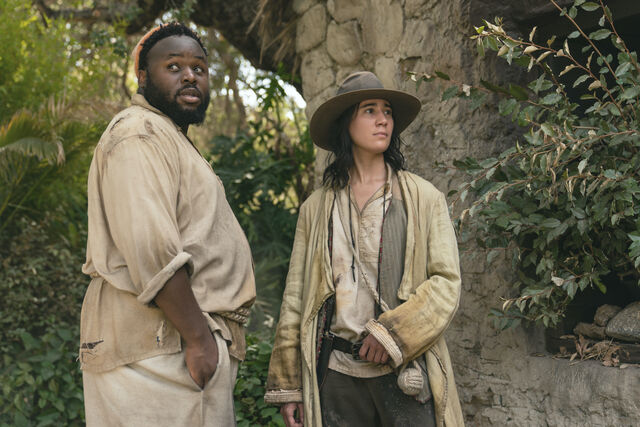
For so long we’ve seen these stories of like, trans and queer “deception” and this is just such a delightful like flipping the script on that. And when you learn about pirates, it’s clearly a society where the normal rules didn’t apply. So like, why not play with that and have fun?
Abso-frickin’-lutely. When I started reading about pirates—rather than just watching the Disney version of pirates which is also great— I was like, hold up. These people were like, creating their own perfect utopian societies of just like, love whoever you want to love, be whomever you want to be, like, be with more than one person, and everyone was super chill about it. It wasn’t this like, “Oh how dare you!” Obviously there was a lot of violence, sure. But the fact that they were just so absolutely queer: I was like, how is this not being talked about more? They were exploring who they were outside of society, and they were getting gay married left and right.
“There are stories of people like us who found themselves in extraordinary situations that allowed them to explore who they were, and to be accepted for who they were.”
Right, yeah. And usually when you see pirates onscreen, they’re all white, which is not how it was. And for so many of the characters, they’re like “I don’t want this extremely stifling society, I want to be a pirate, not a colonialist.” It’s a form of dissent.
I feel like that’s something that most of the characters have in common. Like, this is a chance for a good chunk of us to have a second chance or legitimacy of or take agency of our lives. You have that with Stede, you have that with Blackbeard. You have that with most of the crew on The Revenge, we’re all there to just be like, “This is who I am. I want to take another stab at life on my own terms, you know, even if it doesn’t go great,” And you start to see a family being born out of all these misfits.
And it’s really sweet and so tender: it’s a really funny show, it’s super silly, it’s super goofy, you will be laughing. But it also has so much heart, and so many honest moments of humanity that are so incredibly relatable across the board. I think that that’s going to be one of the hooks, that people will be like: “Wow, I’m, I’m laughing but I’m also real touched. I feel validated in my experience as a human being by seeing all these flawed people trying to figure out who they are.” I kind of love that as you see the characters and the story develop, you’re kind of like “I love everything.” You fall in love with every single one of them. Like, I certainly fell in love with every single one of them. It’s so fun. It’s so juicy and like, it’s definitely violent, they don’t shy away from the fact that there was blood.
I love when comedy uses violence in a fun way, though. It takes it to an extreme where the stakes are so high, but everyone is such a goofball and so silly. I feel it’s there in What We Do In Shadows, for sure. All these people were not about like traditional society, they were like “hell no.” And they came together to just fight and do violence, but also everyone’s tender-hearted, sweet, looking out for each other, and surprising in the ways that they give each other space to just be whatever they want. Which is very freeing, I think.
Absolutely. And I think that’s also why Blackbeard is so drawn to Stede. You’re a pirate, so you low-key take this oath to break all standards and rules and then you end up in a pattern of those cycles. And then you have Stede who is like, coming into the pirate world as a gentleman pirate. You have Blackbeard, who’s just like “The Pirate” that everyone knows and is a fan of. And then he meets Stede and it’s like, “you’re brilliant!” He’s breaking the structures of what it is or what it means to be a pirate. It’s like, “What? The gentleman pirate? What do you mean?”
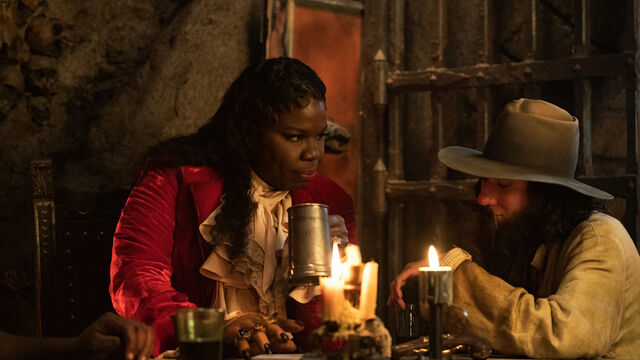
And I just love how that develops and blossoms and how both crews you know also like, learn from each other and break their own patterns and cycles. And it’s so great because like, when we jumped into the project, me and Samson, who plays Oluwande, we were told by [David] Jenkins, that it was like, “Well, you two are like probably the only competent crew members of The Revenge.” And me and Samson had very similar energies to Oluwande and Jim and as we were learning about sailing and all these things. I was the only cast member who actually like, remembered everything about sailing and could locate Canada and all these things. There was a bit that we shot where we were loading a cannon and nobody remembered how to load it and I was like, “I’m gonna have to fucking do this.” Very Jim-like, just: “get out of my way.” Yeah.
“Let me show you how it’s done.” Yeah. I love that about Jim, and I feel like the motto of the show is that there’s actually no wrong way of being a man or of being masculine. You can be a gentleman pirate. You can have a wax nose and a beard and have that be like a big part of how you assess your gender. You can be like a total coward, that’s all fine. It’s not just this hyper-butch world. All these separate genders can coexist and it’s actually fine. Which is lovely.
Yep. Truly one of the things that really drew me in, apart from like reading the character description and like being like “oh my gosh, this is amazing, I would love to do this,” was that as I was reading the scripts and seeing all these men around me having these conversations about what does it mean to be a man, or what it does what it means to be masculine, and having all these different representations of incredibly valid masculinity. Because what does it mean, right? It was so fun to have this space to talk about these things. Outside of the script, we spent a lot of time on set chatting and getting to know each other, and I honestly felt so taken care of by all these cis men which was so refreshing, to be able to like talk and have these like conversations about, “what does it mean to be masculine,” and what does it mean to be a man to you. Like, forget about what society expects from you, what does it mean to be a man, for you? It was so beautiful to hold these conversations together and explore masculinity in a way that’s so just freeing, you know? Because it is that. People have these like visions like, “Oh, man, like no emotions, and like, [grunts]” but you’re watching a pirate show that’s just about all these dudes who are exploring emotions and being tender and sweet with each other and, and caring and I love that.
Ready to take on the high seas with my battle jacket, trusty knife and a cozy cup of tea ✨ Plus an orange for extra flavor 😏 #OurFlagMeansDeath coming in a couple of days on @hbomax #Pirates #Latine #Enby pic.twitter.com/cHZJHnDdIP
— Vico Ortiz (@V_Vico_Ortiz) March 1, 2022
I feel like we’re never encouraged—at least I don’t think cis people are often encouraged—to be like, “what is a man? What is it? Like what is gender?” Like, unless it’s in the most cursory, biological type of way. And when people are encouraged to actually have those discussions, it’s so deep and interesting. Because masculinity is different for every single person.
Yeah, yeah, I really love how you said it, like you have this really fun, diverse array of like, what masculinity feels like. I’m excited to keep exploring it in the show, it just opens up so much more as we go on. And using humor to explore those ideas. I think humor is so healing. Art is healing, but humor itself opens you up in a way that you’re like, “Oh yeah I identify with that.”
“We had all these conversations about, “what does it mean to be masculine,” and what does it mean to be a man to you. Like, forget about what society expects.”
Yes. And when ideas about gender are presented in the form of comedy, they automatically become less scary, even to people who are really scared about those kinds of explorations. And it’s also like, when we do think about figures who crossdressed or aren’t referred to as trans but clearly were like doing something that we today would see as trans. It’s always this tragic framework, like, “Oh, their lives must have been so hard.” But their lives were also probably really awesome and fun.
Holding love and space for all the Queer kids right now 🖤 You are important. You are magic. You belong. Take up space. We’re here. We’re Queer. And we’re only gonna get louder. Get used to it. #SayGay #ProtectTransKids pic.twitter.com/89qCVeRgbQ
— Vico Ortiz (@V_Vico_Ortiz) March 9, 2022
Which is something that I also love about it. When I was talking to David Jenkins about the role and the journey that we were going to go in, it was like “this is part of Jim’s storyline, but it doesn’t revolve around that.” It just happens and they have other stuff that they’re gonna do and like a bunch of other shit.
Because even in modern stories, the media is still so obsessed with making trans and nonbinary stories be all about identity and like, whether we’re confused or not confused, or if everyone around us is having an issue with it, and it’s this whole thing. It’s like: yeah, that also happens, but other stories are also important to tell. We have other things that we do that are dope and awesome and beautiful and fun, and it just so happens that we’re queer while doing them.
So I love that I get to be this badass pirate who has a secret mission that I can’t say yet: more secrets. Really it’s been so fun to like, play a character that is like, spoilers left and right. Not even my parents know—they knew some of it already, just because I was in Puerto Rico when I auditioned for it. But I’ve kept the storyline secret and it’s very, very hard. So I’m really excited to have everyone be like, “I can’t believe you kept this for two, like a year and a half,” and I’m like, “I know.” It’s the Scorpio moon that likes the mystery.
It’s going to be awesome when you’re finally able to talk about it. I feel like the internet is gonna be very excited about this show.
I’m such a fan of it, you know. Like every time we got a new episode, I was like, “I am squealing.” I want to cosplay as everyone. Everyone is so absolutely wonderful as well, like it’s just like it really was such a beautiful experience and so I was looking at it was like being a dream come true, truly.
So many aspects of my personal life bleed into this character. The fact that I like was a fencer for so long: sword fighting was a big part of my upbringing and it’s the same with this character. And me being a drag king and having all these like conversations within myself about like, what does it mean to be masculine, what does it mean to be feminine. And then have all that feed into Jim. Like, the fact that I speak Spanish, and that they were like “Oh, yeah, like, speak as much Spanish as you want.” I was like, “hells yeah.” So it really was just all of the things that I love and adore in one character.
Little kid you in that in that pirate eye patch did not know they were manifesting the future. That’s pretty magical.
And having these conversations, too. I was thrilled to start these convos about what it means to be to be a man, and it’s such a fun, rich show where you don’t expect for these conversations to happen, but I was like, “oh, it’s gonna happen.” We’re gonna dive deeper. And I’m so honored that we get to be part of this conversation and get to dissect this and explore this and like and talk about it and feel free in that exploration. So it’s like something that I’ve been really looking forward to and it’s been like such an honor honestly to be part of these conversations. It’s also been really nice to just be like “I have secrets.” ♦
“Our Flag Means Death” is streaming now on HBO Max.
Help make sure LGBTQ+ stories are being told...
We can't rely on mainstream media to tell our stories. That's why we don't lock our articles behind a paywall. Will you support our mission with a contribution today?
Cancel anytime · Proudly LGBTQ+ owned and operated
Read More in Culture
The Latest on INTO
Subscribe to get a twice-weekly dose of queer news, updates, and insights from the INTO team.
in Your Inbox

